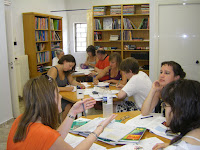Top Five Tips for Novice Teachers
Be prepared
 |
| Be prepared |
Thorough preparation is the key to a successful lesson. You need a lesson plan with sufficient detail
to guide you through the stages of the lesson, but you should be
flexible in the way you use this. You should also make sure that all
your materials and activities are prepared. When teaching vocabulary,
it’s one thing to know what the words mean, and quite another to be
ready to give clear and accurate definitions. When doing a listening
comprehension activity, ensure that you have the correct answers
yourself, and that you’re prepared to explain them.
Don’t Rush
 |
| Don’t Rush |
Adjust the pace of the lesson according to the needs of the learners. If
you rush through the activities too quickly, they won’t have time to
absorb the new language. On the other hand, if the pace is too slow, the
learners will get bored. In order to make your timing flexible, make
sure you have some optional activities in your lesson plan which can be
omitted if time is short, and have some filler activities which you can
use if you have time left at the end of the lesson.
Focus on the learners
 |
| Focus on the learners |
As long as you’re well prepared and confident that you know your
materials thoroughly, you’re free to focus your attention on the
learners. Try to look at your lesson plan and handouts as little as
possible, so you can maintain eye contact with the learners. Be aware of
what they’re doing at all times. During a listening activity, you
should be monitoring the learners, not reading the audio script. During
pair and group work, monitor effectively, notice language areas that
you want to include in feedback, and make sure you’re always available
to provide help and support.
Mind your language
 |
| Mind your language |
As a language teacher, you have many roles. One of the most important is
to provide comprehensible input for your learners. You need to provide a
model, speaking clearly and audibly, writing legibly and accurately,
and your language needs to be adapted to the level of each class. With
an elementary class, make sure the language of your instructions and
explanations is suitably simple, but avoid using unnatural or
exaggerated stress and intonation. With an advanced class, avoid
over-simplifying, but make sure your language doesn’t become too
challenging. Be alert to the learners’ reactions, ask questions to
confirm understanding, and encourage them to seek clarification whenever
necessary.
Be yourself
 |
| Be yourself |
Forget about the old-fashioned metaphor of the teacher as an actor on
stage. A lesson isn’t a performance, a lesson plan isn’t a script, and
the learners aren’t an audience. You can learn from observing other
teachers, emulate some aspects of their teaching, but don’t try to
imitate a persona that doesn’t match your own style of teaching.
Instead, develop the potential that you have within you, listen to
feedback, reflect on your teaching so that, in the words of Penny Ur,
you will become the best teacher that you can be.
© Peter Beech 2016
No comments:
Post a Comment